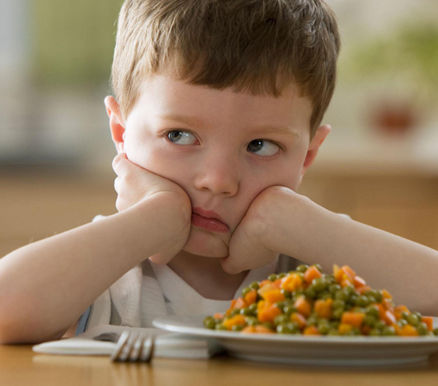1. Children's appetites are affected by their growth cycles. Even babies have fluctuating appetites. Between 1-5 years, it's common for children to be really hungry one day and picky the next.
2. Children have different taste preferences (or palates) from grown-ups.
3. Sometimes life for children seems too exciting to spend time eating.
4. Children learn by testing the boundaries of acceptable behaviour. They can be very strong-willed when it comes to making decisions about food (to eat or not to eat, and what to eat). It's all part of their social, intellectual and emotional development.
5. Sometimes your child will refuse food just because it gets an interesting reaction from you! If children refuse to eat a food, it doesn't necessarily mean they dislike it (after all, they might not have even tasted it yet). They might just be putting on a show of independence to see what you'll do. Try to stay calm when this happens.
6. Children especially toddlers have a strong need for rituals and for what's familiar. If your child asks for pasta without the sauce, this might just be a way for him/her to get simple, easily identifiable foods that boost his/her sense of security.
Consider the following steps to help your child through the phase of FUSSY EATING!
1. Give your child the same food as the rest of the family.
2. Eat your meals together if possible.
3. Give small portions and praise your child for eating, even if they only manage a little. If your child rejects the food, don't force him/her to eat it. Just take the food away without comment. Try to stay calm even if it's very frustrating.
4. Never force feed. If your little one turns her/him head from the spoon, he/she's telling you clearly he/she's had enough - even if it seems she's had very little. Trust that your child will eat when she/he needs. If you force your baby to eat despite signs of him saying "no more," your little one may start associating eating with tension and discomfort and become even more fussier.
5. Don't force the child to eat food, unless he/she is hungry and asks for food himself/herself.
6. Don't leave meals until your child is too hungry or tired to eat.
7. Your child may be a slow eater so be patient.
8. Don't give too many snacks between meals. Limit them to drink some milk and some fruit slices or a small cracker with a slice of cheese, for example.
9. It's best not to use food as a reward. Your child may start to think of sweets as nice and vegetables as nasty. Instead, reward them with a trip to the park or promise to play a game with them.
10. Children sometimes get thirst and hunger mixed up. They might say they're thirsty when really they're hungry.
11. Make mealtimes enjoyable and not just about eating. Sit down and chat about other things.
12. If you know any other children of the same age who are good eaters, ask them round around for tea. A good example can work well, as long as you don't talk too much about how good the other children are.
13. Consider your toddler's sensitive palate: Your toddler may not like the texture, colour, or taste of some foods. This may be why he/she will often claim to dislike a food he/she has never even tried. Try to be patient and keep calm, even if you feel frustrated.



